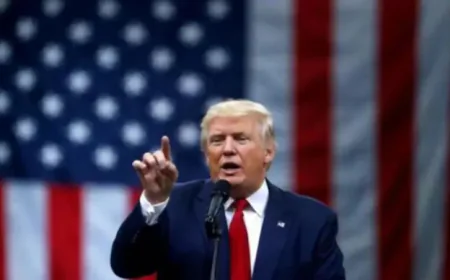Impact of US tariffs on Japan's exports, auto sector most affected
US Tariffs: Japan's economy suffered a setback when its exports declined for the second consecutive month. The biggest reason for this is the new tariffs imposed by the US. Which has a direct impact on Japan's manufacturing industry.

Japan's economy suffered a setback when its exports declined for the second consecutive month. The largest cause of this is the new US tariffs. This will directly affect Japan's manufacturing sector. This is likely to further strain Japan's struggling economy in the next few months. Particularly when the mood of the global trade war is intense.
Japan and the US did not agree on tariffs until July 9. As it was negotiating the removal of the already imposed 25 percent duty on the automobile industry. Japan's export-oriented economic paradigm is thought to be backed by the auto industry. Now, the US has threatened that if no trade agreement is reached by August 1, a 25 percent tariff will be levied on Japanese exports.
Koki Akimoto, an economist at the Daiwa Institute of Research, believes that as tariff rates are fixed and Japanese companies pass on their increased expenses to customers in the US, their competitiveness will decrease and their position in the market may weaken.
Japan's total exports fell by 0.5 percent year-on-year in June, while the market was expecting a 0.5 percent increase. In May, this decline was 1.7 percent, which was the first time in the last eight months.
Japan's exports to the US fell by 11.4 percent year-on-year in June, the biggest decline since February 2021. During this period, automobile exports fell by 26.7 percent, auto parts fell by 15.5 percent, and pharmaceutical exports fell by 40.9 percent.
However, vehicle export volumes have risen by 3.4 percent, which clearly shows that Japanese auto manufacturers are reducing prices to withstand the impact of tariffs and trying to maintain competitiveness by sacrificing their margins. According to Koya Miyamae, senior economist at SMBC Nikko Securities, Japanese companies have currently maintained production levels, but this strategy cannot last long.
Daiwa's Akimoto says that if the trade deal continues to be delayed and the yen remains strong, Japanese companies will eventually be forced to raise prices. In 2023, Japan exported goods worth about 21 trillion yen to the US. Of which about 28 percent was only automobiles.
Japan's trade surplus with the US fell 22.9 percent to 669 billion yen (about $4.51 billion) in June. At the same time, exports to China also declined by 4.7 percent.
Japan's total imports grew by 0.2 percent in June, while the market expected a decline of 1.6 percent. As a result, the country's trade surplus stood at 153.1 billion yen (about $1.03 billion), which is much less than the estimated 353.9 billion yen.
Japan is already facing economic difficulties due to weak domestic demand and rising inflation. Japan's economy has shrunk in the first quarter. In such a situation, this pressure increased by US tariffs has become a new challenge for Japan.
Experts believe that due to the ongoing uncertainty regarding trade deals and tariffs, Japan's Central Bank will not be in favor of raising interest rates at present and will adopt a cautious approach keeping in mind the risk of recession in the economy.















































































